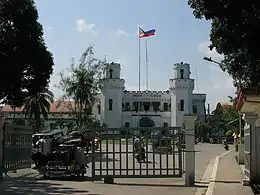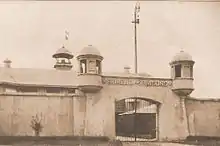Bureau of Corrections (Philippines)
The Bureau of Corrections (Filipino: Kawanihan ng mga Bilangguan, literally "Bureau of Prisons", which was the old name of the agency from 1905 to 1989; abbreviated BuCor) is an agency of the Department of Justice which is charged with the custody and rehabilitation of national offenders, who have been sentenced to three years of imprisonment[2] or more. The agency has its headquarters in the New Bilibid Prison Reservation in Muntinlupa City.[3]
| Kawanihan ng mga Bilangguan | |
.svg.png.webp) | |
| Agency overview | |
|---|---|
| Formed | 1905 |
| Jurisdiction | Philippines |
| Headquarters | New Bilibid Prison Reservation, Muntinlupa City |
| Annual budget | ₱4.24 billion (2020)[1] |
| Agency executive |
|
| Parent agency | Department of Justice |
| Website | http://www.bucor.gov.ph/ |

Organization
It is headed by Corrections Director General USEC GERALD QUITALEG BANTAG.[4] The bureau has 2,862 employees, 61% of whom are custodial (uniformed) officers, 33% are non-uniformed personnel and 6% are members of the medical service.[2]
Command Leadership Structure
- The President of the Philippines as Commander-in-Chief
- The Secretary of Justice
- The Director General of the Bureau of Corrections (DG, BUCOR; with the Rank of Undersecretary donning the 4-Star rank)
- The Deputy Director General for Administration (DDGA; with the Rank of Assistant Secretary donning the 3-Star rank)
- The Deputy Director General for Security and Operations (DDGSO; with the Rank of Assistant Secretary donning the 3-Star rank)
- The Deputy Director General for Reformation (DDGR; with the Rank of Assistant Secretary donning the 3-Star rank)
Directorates
- Directorate for Administration
- Directorate for Security and Operations
- Directorate for Reformation
- Directorate for Reception and Diagnostics
- Directorate for External Relations
- Directorate for Planning and Management
- Directorate for Health Services
- Directorate for Finance and Logistics
Support Services
- Internal Affairs Service
- Human Resource Development Division
- Legal Affairs Division
- Investigation and Intelligence Division
- Personnel Training and Development Division
- Records Division
- Inmate Documents and Processing Division
- Accounting Division
Mission
To maximize the assets' value of the BuCor to effectively pursue its responsibility in safely securing transforming national prisoners through responsive rehabilitation programs managed by professional Corrections Officers.[5]
Mandate
The Principal task of the Bureau of Corrections is the rehabilitation of National Prisoners.[5]
- The Bureau carries out the following task to carry out its mandate:[5]
- Confine persons convicted by the courts to serve a sentence in national prisons.
- Keep prisoners from committing crimes while in custody.
- Provide humane treatment by supplying the inmates' basic needs and implementing a variety of rehabilitation programs designed to change their pattern of criminal or anti-social behavior.
- Engage in agro-industrial projects for the purpose of developing prison lands and resources into productive bases or profit centers, developing and employing inmate manpower skills and labor, providing prisoners with a source of income and augmenting the Bureau's yearly appropriations.
Units
The Bureau of Corrections currently have 7 operating units located nationwide:[2]
- The New Bilibid Prison in Muntinlupa City
- The Correctional Institution for Women (CIW) in Mandaluyong City / and The CIW Mindanao, Sto. Tomas, Davao
- Iwahig Prison and Penal Farm in Puerto Princesa City, Palawan
- Sablayan Prison and Penal Farm in Occidental Mindoro
- San Ramon Prison and Penal Farm in Zamboanga City
- Leyte Regional Prison in Abuyog, Leyte
- Davao Prison and Penal Farm in B.E. Dujali, Davao
Ranks
The following ranks are in force in the BuCor. While the Bureau forms part of the Department of Justice, its ranks follow those of the uniformed services in the Department of the Interior and Local Government.
Commissioned Officers
- Corrections Director General (Lt. General)
- Corrections Deputy Director General for Administration (Maj. General)
- Corrections Deputy Director General for Security and Operations (Maj. General)
- Corrections Deputy Director General for Reformation (Maj. General)
- Corrections Chief Superintendent (Brig. General)
- Corrections Senior Superintendent (Colonel)
- Corrections Superintendent (Lt. Col.)
- Corrections Chief Inspector (Major)
- Corrections Senior Inspector (Captain)
- Corrections Inspector (Lieutenant)
Non- Commissioned Officers
- Corrections Senior Officer 4 (Executive Master Sergeant)
- Corrections Senior Officer 3 (Chief Master Sergeant)
- Corrections Senior Officer 2 (Senior Master Sergeant)
- Corrections Senior Officer 1 (Master Sergeant)
- Corrections Officer 3 (Sergeant)
- Corrections Officer 2 (Corporal)
- Corrections Officer 1 (First Class)
Rank system until 1992
While the BuCor reports to the Department of Justice, in the past it sported a military rank system mirroring the former Integrated National Police and therefore similar to the Chilean Gendarmerie and the Italian Corpo degli Agenti di Custodia. Until 1989 officers and agents sported "Prisons" in their rank title.
| Rank |
|---|
| Prisons Colonel |
| Prisons Lieutenant Colonel |
| Prisons Major |
| Prisons Captain |
| Prisons Lieutenant |
| Prisons Sergeant |
| Prisons Corporal |
| Civil Guardsman First Class |
| Civil Guardsman |
History
Spanish colonial era

The Old Bilibid Prison which was located on Oroquieta Street in Manila was established in 1847 and by a Royal Decree formally opened on April 10, 1866. On August 21, 1870 the San Ramon Prison and Penal Farm was established in Zamboanga City for Muslim and political prisoners opposed to the rule of Spain.
American colonial era
The Iuhit penal Settlement now known as Iwahig Prison and Penal Farm was established in 1904 by the Americans in 28,072 hectares of land. The land areas expanded to 40,000 hectares in the late 1950s.[6] and expanded again to 41,007 hectares by virtue of Executive Order No. 67 issued by Governor Newton Gilbert on October 15, 1912.
The Bureau of Prisons was created under the Reorganization Act of 1905 as an agency under the Department of Commerce and Police. The Reorganization Act also re-established the San Ramon Prison in 1907 which was destroyed during the Spanish–American War in 1898. The prison was placed under the Bureau of Prisons and receive prisoners in Mindanao.[6]
The Correctional Institution for Women was founded on November 27, 1929 by virtue of Act No. 3579 as the first and only prison for women in the Philippines.[6] Later, on January 21, 1932, the bureau opened the Davao Penal Colony in Southern Mindanao.[6]
The New Bilibid Prison was established in 1935 in Muntinlupa due to the increased rate of prisoners.[6]
Contemporary era
Proclamation No. 72 issued on September 26, 1954, established the Sablayan Prison and Penal Farm in Occidental Mindoro, and the Leyte Regional Prison was established on January 16, 1973, under Proclamation No. 1101.[6]
The Administrative Code of 1987 and Proclamation No. 495, issued on November 22, 1989, changed the agency's name to the current Bureau of Corrections from Bureau of Prisons.[6]
List of Director Generals
- M. L. STEWART -1910 - 1913
- W.H. DADE -1914 - 1920
- J.W. QUILLEN -1920 - 1923
- DIR. RAMON VICTORIO -1923 - 1930
- LT COL PAULINO SANTOS -1930 - 1937
- MAJ ERIBERTO B MISA SR. -1937 - 1949
- DIR. EUSTAQUIO BALAGTAS -1949 - 1954
- ATTY. ALFREDO M. BUNYE -1954 - 1958
- DIR. ENRIQUE A. FERNANDEZ -1958 - 1962
- COL EDUARDO QUINTOS -1962
- DIR. FELIX P. AMANTE -1962 - 1965
- COL DOMINADOR M DAÑAN -1965 - 1966
- DIR. ALEJO S. SANTOS -1967 - 1971
- B/GEN VICENTE R RAVAL -1971 - 1982
- DIR. CATALINO J. MACARAIG JR. -1979
- ATTY. RAMON J. LIWAG -1982
- B/GEN VICENTE E EDUARDO -1982 - 1986
- LT COL EMILIO N CEA -1986
- B/GEN MELITON D GOYENA -1986 - 1991
- ATTY. CLETO B. SENOREN -1991
- DIR. ERIBERTO B. MISA JR. -1991 - 1993
- ATTY. VICENTE G. VINARAO -1994 - 1998
- LT GEN PEDRO G SISTOZA -1998 - 2001
- COL RICARDO B MACALA -2001 - 2003
- USEC. DIONISIO R. SANTIAGO -2003 - 2004
- ATTY. VICENTE G. VINARAO -2004-2007
- DIR. RICARDO B. DAPAT -2007
- USEC. OSCAR C. CALDERON 2007-2010
- GEN ERNESTO L DIOKNO -2010-
- ATTY. MANUEL G. CO -May 2011-August 2011
- LT GEN GAUDENCIO S PANGILINAN JR -2011-2012
- ATTY. MANUEL G. CO -August 2012-November 2012
- ATTY. RAFAEL MARCOS Z. RAGOS -November 2012-March 2013
- DIR. FRANKLIN JESUS BUCAYU
- LT GEN RICARDO RAINIER G CRUZ
- ATTY. BENJAMIN DELOS SANTOS
- DIR. ROLANDO ASUNCION
- ASEC VALFRIE TABIAN
- USEC RONALD M DELA ROSA -April 30-October 12, 2018
- USEC NICANOR E FAELDON -November 2018-September 2019
- USEC GERALD Q BANTAG -September 2019-Present
Logo
The logo of the bureau represents the government agency's mandate, the rehabilitation of inmate. The logo focuses on the man in prison as the main concern of rehabilitation. It presents man behind bars, but who looks outwards with the hope of rejoining the free community. The 7 rays of the sun represent the 7 operating prisons and penal farms who carry out the reformation programs of the bureau. The color green symbolizes hope. The color orange is symbolic of happiness. The bar of justice represents the Philippine justice system.
Capital punishment
When the Philippines had the death penalty, male inmates condemned to death were held at New Bilibid Prison and female inmates condemned to death were held at Correctional Institution for Women (Mandaluyong).[7] The death chamber for inmates to be electrocuted was in Building 14, within the Maximum Security Compound of New Bilibid. The Bureau of Corrections (BuCor) Museum previously served as the lethal injection chamber.[8]
References
- Aika Rey (8 January 2020). "Where will the money go?". Rappler. Retrieved 29 May 2020.
- Department of Justice, retrieved 2008-05-27
- "About the Bureau of Corrections Archived 2009-10-05 at the Wayback Machine." Bureau of Corrections. Retrieved on October 2, 2010. "Bureau of Corrections NBP Reservation Muntinlupa City, Philippines."
- "Duterte names ex-Manila jail warden Bantag as new BuCor chief". Philstar.com.
- Bureau of Corrections, retrieved 2008-05-27
- Bureau of Corrections, archived from the original on 2008-04-11, retrieved 2008-05-30
- Araneta, Sandy (2001-10-22). "1,020 death convicts await execution". The Philippine Star. Retrieved 2017-05-03.
- Torres-Tupas, Tetch (2015-07-15). "DOJ drawing list of inmates to occupy death chamber-turned-prison". Philippine Daily Inquirer. Retrieved 2017-05-04.